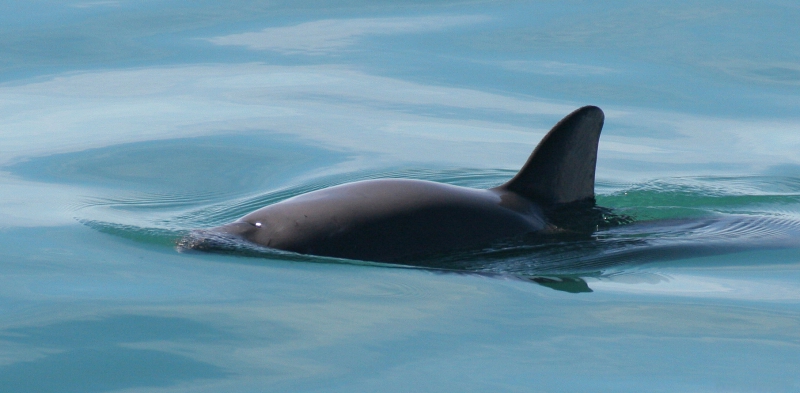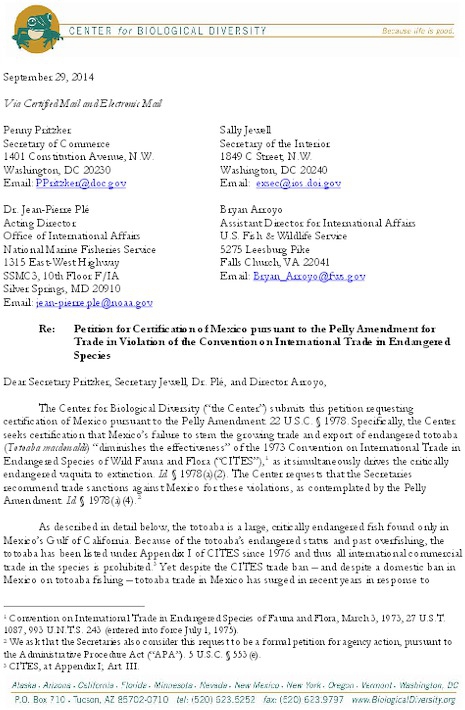From the Open-Publishing Calendar
From the Open-Publishing Newswire
Indybay Feature
Trade Sanctions Sought to Halt Extinction of Mexican Porpoise, Fish
WASHINGTON— The Center for Biological Diversity on September 29 formally requested that the Obama administration impose trade sanctions against Mexico to stop the country’s illegal totoaba fishery, which is driving both the endangered totoaba and the vaquita — a porpoise that’s one of the planet’s most imperiled animals — to extinction.
The vaquita is the world’s smallest porpoise and exists only in Mexico’s Gulf of California. It has suffered a dramatic and alarming decline, dropping from 200 animals in 2012 to just 97 in 2014. Without help, scientists predict vaquitas could be extinct by 2018.
Vaquita are often entangled in illegal gillnets set for totoaba, and in July 2014 a group of eminent scientists urged Mexico to “immediately” take “drastic steps” to avoid the vaquita’s otherwise imminent extinction, including the use of “all available enforcement tools” to stop illegal totoaba fishing and trade.
“The vaquita is truly about to disappear from the planet, but Mexico hasn’t listened to the alarm bells going off,” said Sarah Uhlemann, international program director at the Center. “Mexico must stop this illegal fishing now to save these porpoises from extinction.”
Totoaba are large marine fish that also live in Mexico’s Gulf of California. Despite being “critically endangered,” the fish is highly sought after in China for its swim bladder, used to make a soup believed to boost fertility and improve skin. While the international totoaba trade is banned, in the black market a single bladder can reportedly sell for $14,000 U.S. Dubbed “aquatic cocaine,” dried totoaba bladders are often smuggled from Mexico into the United States and then to China.
“It’s ridiculous that China’s appetite for fish bladder soup may cause two endangered species to go extinct,” said Uhlemann. “Mexico must get a handle on the illicit and growing totoaba trade to save the species.”
Under an American law referred to as the “Pelly Amendment,” the Center’s petition asks the United States to officially recognize or “certify” that Mexico’s failure to stop the totoaba trade “diminishes the effectiveness” of the 1973 Convention on International Trade in Endangered Species of Wild Fauna and Flora. Under the terms of this treaty, Mexico, the United States and other nations have committed to halt international commercial trade in imperiled animals, yet the Mexican totoaba trade has surged in recent years. If the secretary of commerce agrees, President Obama may then ban import of all Mexican wildlife imports until totoaba trade is reduced.
Background
The vaquita is the world’s smallest porpoise, measuring just 5 feet in length. A curious-looking animal, the vaquita has black smudges around its eyes and mouth that are sometimes described as makeup gone wrong.
Scientists predict the vaquita will be extinct by 2018 unless “drastic” and “immediate” action is taken to save the species. In addition to being caught in totoaba nets, vaquita are also killed in Mexican shrimp nets — and much of that shrimp is imported into the United States.
Totoaba, or Mexican seabass, are huge marine fish growing up to 6 feet in length and weighing 220 pounds. Dried totoaba bladders are used for Chinese “buche” soup, which reportedly can fetch $25,000 per bowl.
Negotiated in 1973, the Convention on International Trade in Endangered Species of Wild Fauna and Flora requires nations to regulate wildlife trade through a permitting process and prohibit commercial import and export of highly endangered species. 180 nations have ratified CITES, which controls trade in more than 30,000 species.
The United States has successfully used Pelly Amendment sanctions in the past to enforce whaling quotas and stop rhino and tiger trade in Taiwan.
Read more about vaquitas and the Center’s work to save them: http://www.biologicaldiversity.org/species/mammals/vaquita/index.html
Photo: NOAA
The Center for Biological Diversity is a national, nonprofit conservation organization with more than 775,000 members and online activists dedicated to the protection of endangered species and wild places. http://www.biologicaldiversity.org
http://www.biologicaldiversity.org/news/press_releases/2014/totoaba-vaquita-09-29-2014.html
Center for Biological Diversity
http://www.biologicaldiversity.org/
Vaquita are often entangled in illegal gillnets set for totoaba, and in July 2014 a group of eminent scientists urged Mexico to “immediately” take “drastic steps” to avoid the vaquita’s otherwise imminent extinction, including the use of “all available enforcement tools” to stop illegal totoaba fishing and trade.
“The vaquita is truly about to disappear from the planet, but Mexico hasn’t listened to the alarm bells going off,” said Sarah Uhlemann, international program director at the Center. “Mexico must stop this illegal fishing now to save these porpoises from extinction.”
Totoaba are large marine fish that also live in Mexico’s Gulf of California. Despite being “critically endangered,” the fish is highly sought after in China for its swim bladder, used to make a soup believed to boost fertility and improve skin. While the international totoaba trade is banned, in the black market a single bladder can reportedly sell for $14,000 U.S. Dubbed “aquatic cocaine,” dried totoaba bladders are often smuggled from Mexico into the United States and then to China.
“It’s ridiculous that China’s appetite for fish bladder soup may cause two endangered species to go extinct,” said Uhlemann. “Mexico must get a handle on the illicit and growing totoaba trade to save the species.”
Under an American law referred to as the “Pelly Amendment,” the Center’s petition asks the United States to officially recognize or “certify” that Mexico’s failure to stop the totoaba trade “diminishes the effectiveness” of the 1973 Convention on International Trade in Endangered Species of Wild Fauna and Flora. Under the terms of this treaty, Mexico, the United States and other nations have committed to halt international commercial trade in imperiled animals, yet the Mexican totoaba trade has surged in recent years. If the secretary of commerce agrees, President Obama may then ban import of all Mexican wildlife imports until totoaba trade is reduced.
Background
The vaquita is the world’s smallest porpoise, measuring just 5 feet in length. A curious-looking animal, the vaquita has black smudges around its eyes and mouth that are sometimes described as makeup gone wrong.
Scientists predict the vaquita will be extinct by 2018 unless “drastic” and “immediate” action is taken to save the species. In addition to being caught in totoaba nets, vaquita are also killed in Mexican shrimp nets — and much of that shrimp is imported into the United States.
Totoaba, or Mexican seabass, are huge marine fish growing up to 6 feet in length and weighing 220 pounds. Dried totoaba bladders are used for Chinese “buche” soup, which reportedly can fetch $25,000 per bowl.
Negotiated in 1973, the Convention on International Trade in Endangered Species of Wild Fauna and Flora requires nations to regulate wildlife trade through a permitting process and prohibit commercial import and export of highly endangered species. 180 nations have ratified CITES, which controls trade in more than 30,000 species.
The United States has successfully used Pelly Amendment sanctions in the past to enforce whaling quotas and stop rhino and tiger trade in Taiwan.
Read more about vaquitas and the Center’s work to save them: http://www.biologicaldiversity.org/species/mammals/vaquita/index.html
Photo: NOAA
The Center for Biological Diversity is a national, nonprofit conservation organization with more than 775,000 members and online activists dedicated to the protection of endangered species and wild places. http://www.biologicaldiversity.org
http://www.biologicaldiversity.org/news/press_releases/2014/totoaba-vaquita-09-29-2014.html
Center for Biological Diversity
http://www.biologicaldiversity.org/
Add Your Comments
We are 100% volunteer and depend on your participation to sustain our efforts!
Get Involved
If you'd like to help with maintaining or developing the website, contact us.
Publish
Publish your stories and upcoming events on Indybay.
Topics
More
Search Indybay's Archives
Advanced Search
►
▼
IMC Network




